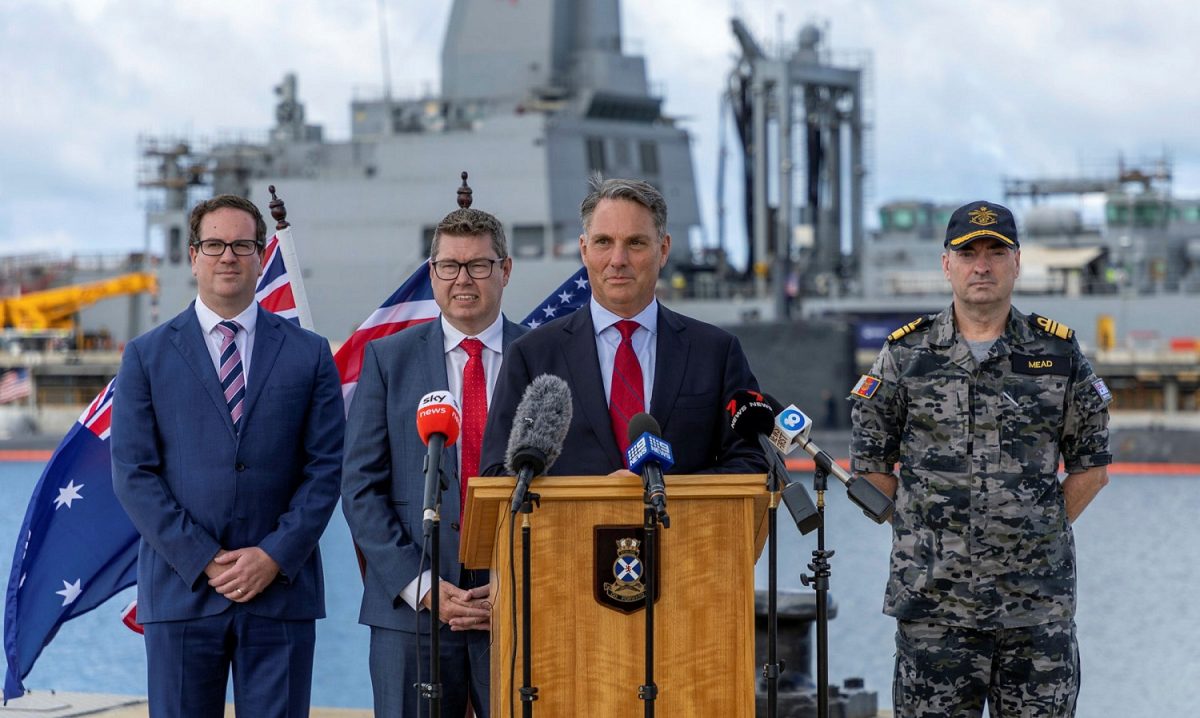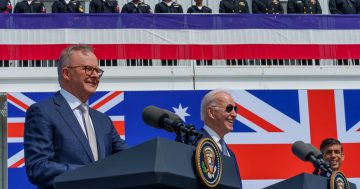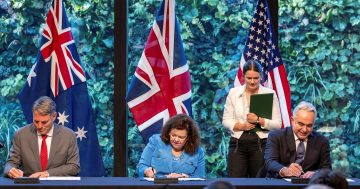
Concept art of the SSN-AUKUS submarine design. Image: UK MoD.
A small number of US Republican congressmen are holding up the passage of critical legislation required for the AUKUS deal between the US, UK, and Australia to proceed.
It’s just over two years since the deal was announced and more than six months since details of the nuclear-powered submarine deal for Australia were revealed, but a group of congressmen remain concerned about the US’s capacity to transfer the vessels to Australia, a move that has dragged Australia into a broader fight over US defence spending.
Speaking at a Senate hearing into the AUKUS deal, the chairman of the US Senate’s Foreign Relations Committee, Democratic Senator Bob Menendez, said Congress’s execution of the trilateral agreement had “not gone as smoothly as some of us would have hoped”.
Senator Menendez said “time is of the essence” in the face of an increasing threat from China. “This is a critical moment.”
US export controls and technology and information transfer laws will need to be relaxed, or Australia and the UK made exempt from them, for the deal to proceed.
In the past, the US has asked Australia to tighten its military export controls but has so far been unable or unwilling to. But that may change with the appointment by the government of Peter Tesch and Professor Graeme Samuel to review Australia’s Defence Trade Controls Act 2012.
“The Albanese Government is committed to ensuring the Australian export control regime remains fit-for-purpose in a rapidly evolving strategic environment,” Deputy Prime Minister and Defence Minister Richard Marles said in a 29 August release.
“This review will ensure we balance the need for greater technology sharing between our international partners, the protection of our sensitive technologies, and our international obligations.”
While the government didn’t directly link the review to AUKUS or the government’s sovereign guided weapons enterprise organisation (GWEO) ambitions, it logically follows that if Australia’s own trade control laws are reviewed and tightened, the US may have fewer concerns over facilitating such transfers.

Deputy Prime Minister and Defence Minister Richard Marles has announced Australia’s Defence Trade Controls Act 2012 will be reviewed. Photo: ADF.
But despite a unanimous bipartisan vote in July to support the transfer of two Virginia class submarines to Australia, a group of Republicans led by Mississippi Senator Roger Wicker has blocked plans to gain congressional support to enable the required transfer of technologies to occur.
In July, despite Senator Wicker voting for Australian naval and industry personnel to commence training on US nuclear-powered submarines, he subsequently blocked a funding authorisation and legislation that would allow Australia to invest in US shipyards to increase submarine production.
“It makes sense to be sure we have enough submarines for our own security needs before we endorse that pillar of the [AUKUS] agreement,” Senator Wicker told media in July.
In the 5 September hearing, Senator Menendez said Congress “needs to play its part if the agreement is going to work”.
“If we fail to move forward with full congressional support of AUKUS, including the nuclear-powered submarines, we are doing Beijing’s job for them,” he said.
But the US is not even building half the number of nuclear-powered submarines it needs, with an average of just 1.2 Virginia class boats being launched per year of a requirement for 2.5, and the planned seed money from Australia may not come quickly enough.
“The [Biden] administration still hasn’t put forward a credible long-term plan to ensure that our Navy meets its requirements to have 66 attack subs in a reasonable timeframe,” Republican Senator Bill Hagerty said.
“Ladies and gentlemen, that’s a problem.”
Testifying to the US Senate Foreign Relations Committee on 5 September, the Assistant Secretary of the Biden Administration’s Bureau Of Political-Military Affairs, Jessica Lewis, said, “the success of AUKUS is not predetermined. It must be carefully planned and implemented”.
“While AUKUS presents us with a generational opportunity, we also have a historic responsibility to get this right,” she said.
“We have already achieved remarkable momentum in the past two years, but there is more we need to do.
“By modernising our partnerships and deepening our diplomatic, security and defence cooperation, we can promote security and prosperity, not just in this critical region, but across the globe. AUKUS is a transformational partnership, but we need to get this right.”
Original Article published by Andrew McLaughlin on Riotact.










